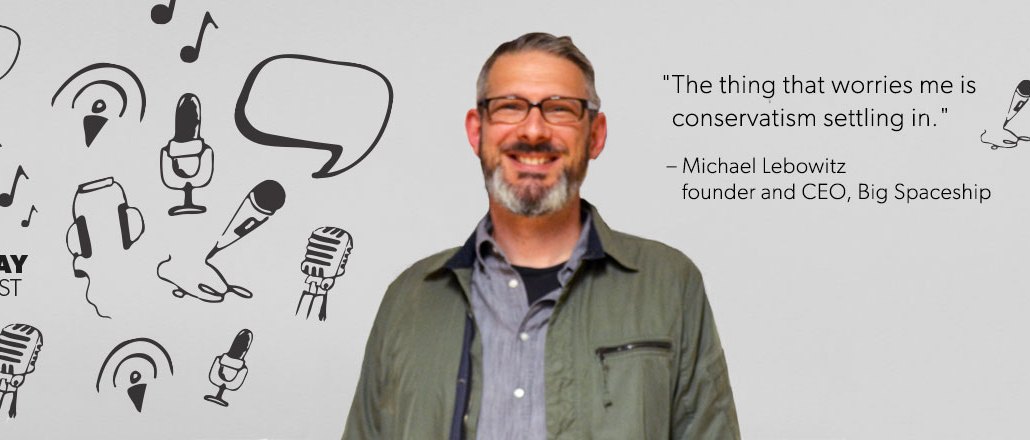Save 50% on a 3-month Digiday+ membership. Ends Dec 5.
Big Spaceship’s Michael Lebowitz: ‘The future is arriving, and it’s weird’

Michael Lebowitz is an old-timer, at least in Internet years.
The CEO and co-founder of Big Spaceship opened a digital agency back in the year 2000, when Brooklyn’s DUMBO neighborhood was considered a cheap area to open an office and digital meant websites and banner ads. Today, Lebowitz works in a landscape that he freely admits is totally “weird.”
Lebowitz joined us on the Digiday Podcast to talk about what’s changed, what’s stayed the same and why everyone seems to want to crowd into his little corner of the Internet these days.
On the crowded nature of the Internet
“Everybody is trying so hard to fill every moment with some kind of communication and consumers are trying really hard to have fewer and fewer moments of that. We’re going to have to hit some sort of detente any more. We have to figure out what brands are going to do in a world where they can only exist for tiny fractional pieces of time. We’re getting to this place where there might be a total divergence from history to present. The future is finally arriving, and it’s going to be pretty weird.”
On what it was like to be a digital agency in 2001
“Digital meant websites for the most part and banners ads, and that was it. We spend so much time talking about how different it was then in the prior era. But it wasn’t that different. We had more expressiveness. It felt new. We weren’t confined to 30-second blocks of time that progressed at the same pace. We were all so naive. Most of that was really horrible in retrospect. There was this whole attitude across the whole industry of ‘let’s figure this out.’ Nobody had figured this out. There was no accountability because there was no history. The technology was horrible. It was such an arduous process to get anything you wanted to happen to happen.”
On how hard it is to be “cool”
“There weren’t as many ways of discovering cool things. So something could hit the water cooler and go everywhere. We were just making websites because they were cool websites; people would just show up to them. They were seeing things they hadn’t seen before on the Web. It’s not possible any more.”
Ad position: web_incontent_pos1
Why there’s room for everyone
“Nobody can sit inside their organization all day and see the forest. Nobody can see their opportunities better than we can know them. Our job is to look at those the way they never can. It’s the meeting of those minds. There’s certainly room for everybody. I don’t think anyone is hurting for opportunities or things to do. We work with Purina. And we’ve worked with BuzzFeed. and BuzzFeed can work with Purina, and that’s no skin off our ass. Can we figure out how to co-exist in this way?
In defense of the AOR
“The set of services we provide has to do with a balance of both the moment to moment, both insight and execution that are required of modern, social marketing. And we’re thinking more broadly about products and platforms. Sure, you can separate those out and allocate those to different groups. But then you need a strong group internally to be a through-line of strategic consultancy. But then, how do you have someone inside who has to operate as a unified partner? I think the AOR relationship made less sense in the older world of advertising than it does now. Campaigns existed in a predictable space and in a predictable size. You didn’t need an ongoing agency as much as you do now.”
On why Web ads are so intrusive
“There’s a reason Facebook is aping a television model right now. It’s about paying to get an eyeball in a state of interruption. I get it: It’s a way of monetization that works. Aggregate eyeballs and interrupt them. I’d like to think optimistically that there are brands out there that figured out how to be valuable in the right time and quiet in the right time and still get credit for being quiet. It’s hard to go back.”
More in Marketing

Ulta, Best Buy and Adidas dominate AI holiday shopping mentions
The brands that are seeing the biggest boost from this shift in consumer behavior are some of the biggest retailers.

U.K. retailer Boots leads brand efforts to invest in ad creative’s data layer
For media dollars to make an impact, brands need ad creative that actually hits. More CMOs are investing in pre- and post-flight measurement.
Ad position: web_bfu